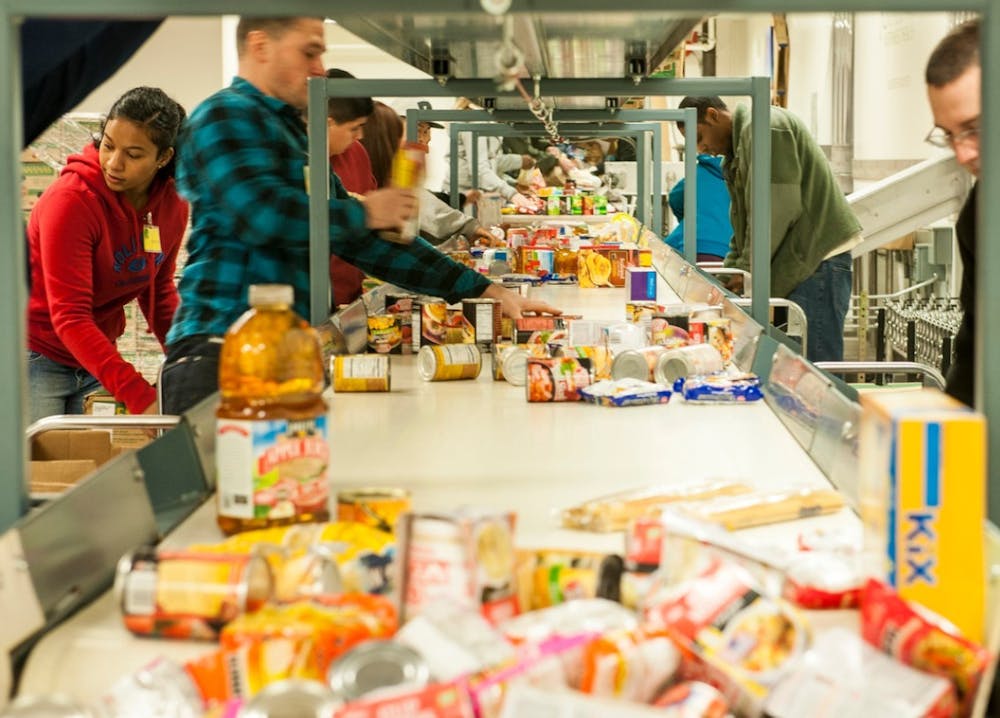The pandemic does not affect all Americans equally. Members of racial and ethnic minorities, as well as those without financial security, are experiencing a disproportionate burden of the pandemic. Kristin Topel has seen the burdens in the Baltimore community firsthand.
“Social determinants of health and social inequities are always there — what this crisis has done is made it impossible to ignore,” Topel said in an interview with The News-Letter. “Many people are living in poverty or just outside of poverty — [the pandemic] is certainly hitting some populations more significantly than others.”
Topel is a program manager of Hopkins Community Connection (HCC), a team of student advocates and staff which oversee resource desks at clinics in the Hopkins Hospital. There are resource desks at the Harriet Lane Clinic, Comprehensive Care Practice and Bayview Children’s Medical Practice. The advocates aim to connect patients to essential resources such as food, housing, and finding and maintaining steady employment and childcare.
In an email to The News-Letter, junior and HCC advocate Nejat Alkadir wrote that families from a lower socioeconomic status battle chronic stress that accompanies income inequality. The pandemic has heightened the financial burden on these families.
“Health is closely linked to one’s income status,” Alkadir wrote. “Many of our clients work in essential jobs in which it is difficult for them to maintain social distancing in their travel to work and at their place of work, [which] may not have adequate PPE.”
This stress has also been linked to depressed immunity, which further increases their risk of contracting the virus.
According to LaToya Mobley, a pediatric social worker at the Harriet Lane Clinic, the barriers to accessing healthcare are extensive. In an interview with The News-Letter, Mobley described barriers ranging from a lack of transportation to a feeling of powerlessness because people do not feel like they are able to advocate for themselves. Topel highlighted scenarios, that she said are not uncommon for Baltimore.
“Let’s say you have to go into a hot office, and you have to wait there for many hours, but you don’t have childcare, so you have to bring your toddler,” Topel said. “Or you need to print an application and have a high enough literacy to fill it out, then you need to scan it and email it, but you don’t have a scanner.”
Topel explained how there are a variety of resources that exist to help community members in Baltimore, but many of them are overwhelmed due to the increased demand.
A food distribution site opened at the Harriet Lane Clinic at the beginning of the crisis with plans to serve 20 families a month. According to Topel, the program has provided food to over 100 families in four weeks.
“Food is disappearing as fast as they can get it,” Topel said. “It’s true for patients and true for staff, because we are purchasing food for staff as well.”
The Hopkins Hospital has also initiated other food programs. It has partnered with Maryland Food Bank to deliver food bags to the East Baltimore community.
Alkadir explained that connecting clients to food resources has been a top priority during the pandemic. She and other HCC advocates provide families with information on free food distribution sites in Baltimore and assist families in applying for the Maryland Supplemental Nutrition Assistance Program (SNAP).
“We’re seeing more families screen positive for food insecurity as the long-term financial impacts of this pandemic begin to surface,” she wrote.
According to Alkadir, her work goes beyond simply providing resources.
“The mission of HCC is more than providing our families with lists of food pantries but about advocating for the health and well-being of historically disadvantaged communities in Baltimore,” Alkadir said.
Mobley described how there is a whole team for patients at the Harriet Lane Clinic, including the HCC team, social workers and a mental health consultant.
So what is causing these health and social disparities in Baltimore? According to Mobley, policies and programs in Baltimore do not support the interests of disadvantaged populations.
“As programs emerge over time, it just perpetuates the disadvantaged staying disadvantaged,” Mobley said. “There have been policies in place for so long here in Baltimore — broken policies — that do not benefit disadvantaged populations.”
Policies are an integral part of eradicating these health determinants.
“There are policies in place that are not created with the purpose of finding equity,” Topel said. “The policies that are in place are perpetuating a cycle.”
Topel explained the importance of not only including the leaders of community service organizations but also the families that are being impacted in policy-making discussions. Alkadir discussed harnessing the power of community organizations such as religious or social service groups.
“Any approach to address healthcare disparities in Baltimore has to involve community-based organizations,” Alkadir explained. “We must have conversations between community members and public health officials to spread awareness on preventative practices.”
Topel gave an example of how these policies don’t always reflect the reality of the situation. There were a lot of drive-up food sites that were being established throughout Baltimore, but many of the families that are in need of these resources are not able to drive up nor can they carry a 30-pound box of food all the way home.
“People who don’t see it, don’t know it, don’t believe it, are not going to create policies that are equitable,” Topel said. “My hope is that at the end of this crisis we no longer have to have conversations about how significant those disparities are. You cannot ignore it anymore.”





